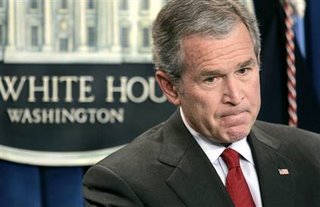
There has been a lot of debate in the three years since the Iraq War began. Are we there for Oil or to fight terrorism? Well, no matter who is right, this war is just a backdrop in a much larger sociopolitical drama. The debate is compelling, but when you see the bigger picture you are compelled to question your most basic presumtions.
When the Bush Administration came to power in January of 2000, the conservative movement in America acheived a pinnacle of success: they finally controlled two branches of the federal government (executive and legislative) and were within striking distance of controlling a third (judicial; note recent fights over Supreme Court nominees). It was the culmination of an almost forty year effort to roll back a liberal agenda over-reach that in the period between the FDR and Johnson Administrations. The details of that argument are beyond the scope of this post, but it starts with a philosophical debate that dates back to the founding of the nation: What is the role of the Federal government in the lives of Americans, and how much power does the Federal government have over the individual states?
It is well kown that Franklin D. Roosevelt implemented a broad sweep of federal programs to get America on it's feet again after the Great Depression, The New Deal. Thirty years later came Lyndon B. Johnson and The Great Society. Conservatives, as I understand it, hate the expansion of Federal Government these programs represent, and they abhor how the Supreme Court began legislating from the bench passing decisions that were consistent with liberal thinking as opposed to maintaining their neutrality such as with Brown v. Board of Education and Roe v. Wade. Ronald Reagan and the American Conservatism Movement slowly began turning liberal policies around preaching new economic policies and a strong America. The Contract with America helped solidified Republican Congressional control in 1994. This conservative climate shift in Washington and across the nation also ushered in a new age of conservative lobbying and conservative media control, and unprecedented corporate influence.
By the time Bill Clinton was sworn in to a second term in 1996 (much to Republicans dismay after their attempted impeachment of him) , the stage was set for taking over the White House. Hitting the airwaves right after the 1998 mid-term campaign were reports of fund raising for the next potential Republican candidate: Gov. George W. Bush of Texas. Looking at the Republican rise and the changes in Federal spending at face value one could brush off the significance as just a change in the electorate. Then you look at how Bush came to power in 2000 and you raise an eyebrow, but then again there is a little something called "The Project for a New American Century".
This is a conservative think tank promoting policies that from their point of view strengthen America home and abroad. In 1998, a group of PNAC conservatives wrote an open letter to then President Clinton encouraging his administration to take an aggressive stand against Saddam Hussein. They stated that a free Iraq would help spread democracy through out the middle east, create a strategic advantage for the US, and secure American "interests" in the region. This policy position, written three years before 9/11, seems to provide a very disturbing side note to what is happening today in 2006. What makes it all the more disturbing is the fact that the architects and signers of that document are they very same people at the heart and head of the current Bush Administration. Donald Rumsfeld, Dick Cheyney, John Bolton, Paul Wolfowitz were all signers of that letter to Clinton, and they are the very same War Hawks who pushed for the war in Iraq (Jeb Bush was also a signer, the Governor of Florida that played a large part in the 2000 election).
PNAC wrote in their policy paper "Rebuilding America's Defenses" that the only way to get Americans to support a larger role in world affairs is an event on par with a Pearl Harbor? That opinion feeds fuel to 9/11 conspiracy theorists, and, quite frankly, has made me suspicious as well. (read here if you'd like what the other side says about these theories).
Today terrorism is on the rise, Iraq is on the verge if not in the middle of a civil war, and the poll numbers for Bush and the Republican party are sinking lower and lower. The bigger picture here is that, though Iraq has begun to try and govern itself, the whole Iraq War has bred the kind of western resentment that created Al-quaeda type terrorism in the first place. Resentment against america builds. What's more is that Islamic fundamentalists are getting politically smarter. Hamas, a recognized terror organization, was voted into power in a Democratic Election in Palestine.
As the Bush Administration keeps finding justifications for granting greater authority to a Unitary Executive, the middle east might destabilize further as Iran asserts it's autonomy. I'll go into these issues in The Big Picture Parts 4 & 6, but in the meantime keep an eye on the middle east this year as well as reports coming out of the Islamic world and the policies of the Bush Administration's war on terror.
No comments:
Post a Comment